With grant support from the UCI’s Heidi Lynn Sculthorpe Scholars Program, Monmouth University students London Jones and Aidan Bodeo-Lomicky conducted research on two timely topics: Discriminatory barriers to beach access in New Jersey and threats to the critically endangered North Atlantic right whale. We caught up with London and Aidan recently to ask a few questions about their research. Read what they had to say and download copies of their papers below.
Paper Title: Free, but for a Fee: Addressing Racially Discriminatory Burdens on New Jersey Beaches, One Beach Tag at a Time
 Student Researcher: London Jones
Student Researcher: London Jones
Year and Major: Senior, Communication
Q: Your research focused on Asbury Park, Belmar and Cape May as case studies. What was your reasoning for selecting those three towns?
My reasoning behind the selection of Asbury Park, Belmar, and Cape May was that I aimed for difference in coastal location, town history, population, and racial composition so that my case studies could encapsulate all types of New Jersey beach towns. I want my proposal to be adopted statewide, so it was pertinent for me not to only focus on towns in a certain category, like those in South Jersey or those with only wealthy residents. Rather, I selected a diverse mix of towns to highlight the common flaw they share despite their differences: the beach tag.
Q: While Jersey Shore visitors generally regard the beach tag as a hassle, it is seldom discussed from the standpoint of imposing racially discriminatory burdens. How does the practice of requiring them impose an unfair burden on Black beachgoers?
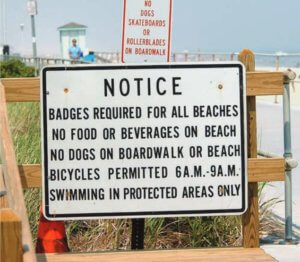 As described in my paper, the practice of requiring beach tags imposes a disproportionate burden on Black beachgoers in cost, access, and how beach tag revenues are spent. Historically, beach tags were imposed as a way of keeping nonresidents off the beaches of certain towns, which had populations majorly consisting of white communities. Although rights for public access along New Jersey beaches have been secured, the constant increases in beach tag prices and caps on numbers of tags sold restricts access for low income communities and those who do not reside in the beach towns, which is primarily the Black community. Additionally, beach tag revenues are then spent on frivolous beach amenities rather than necessary spending to make those shorelines safer and more accessible to those who either visit after hours or forego attending the beach all together to avoid the need for beach tags.
As described in my paper, the practice of requiring beach tags imposes a disproportionate burden on Black beachgoers in cost, access, and how beach tag revenues are spent. Historically, beach tags were imposed as a way of keeping nonresidents off the beaches of certain towns, which had populations majorly consisting of white communities. Although rights for public access along New Jersey beaches have been secured, the constant increases in beach tag prices and caps on numbers of tags sold restricts access for low income communities and those who do not reside in the beach towns, which is primarily the Black community. Additionally, beach tag revenues are then spent on frivolous beach amenities rather than necessary spending to make those shorelines safer and more accessible to those who either visit after hours or forego attending the beach all together to avoid the need for beach tags.
Q: Do you believe there were discriminatory motives behind the beach access barriers discussed in your paper or are they policies that carry that unintended consequence?
As underscored by the Black Lives Matter movement, many majority communities do not always have the best interests of the Black community in mind. While many past instances of discrimination on the Jersey shore, as described in my paper, have been motivated by discriminatory intent, I do not believe that the current beach access barriers have been imposed due to discriminatory motives. Rather, these barriers cause unintended consequences to the Black communities, placing unfortunate burdens on their lives when attending their favorite shore towns. Nonetheless, any impact to the Black community, purposeful or not, should be addressed with urgency and sensitivity.
Paper Title: A Colossal Climate Change Challenge: Adapting to Protect the North Atlantic Right Whale in a Dynamic Marine Environment
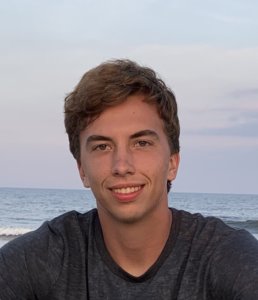 Student Researcher: Aidan Bodeo-Lomicky
Student Researcher: Aidan Bodeo-Lomicky
Year and Major: Junior; Major: Marine and Environmental Biology and Policy; Minor: Political Science
Q: Scientists estimate there are only about 400 North Atlantic right whales left in the wild. What are some of the ways that climate change is exacerbating the threat to them?
Climate change is warming the waters off New England faster than any other region on the planet, which is having severe impacts on this aquatic ecosystem. The primary food source for the North Atlantic right whale is a subarctic zooplankton called Calanus finmarchicus, and these copepods must migrate to colder, deeper waters to survive this warming. Naturally, the whales must follow their food, and as they do so, they enter new regions without the same protections against ship strikes and fishing gear entanglement. Since 2017, 10% of the entire North Atlantic right whale population has been killed or severely injured, with most of these incidents occurring in new habitats that have not historically warranted conservation measures for this species but now do as a result of climate change. Furthermore, as the whales must travel greater distances to feed, they expend valuable energy and time, which lowers their overall health and reproductive success. Climate change has rapidly thrown this entire region out of balance, and now it is up to managers to quickly adapt in an effective way.
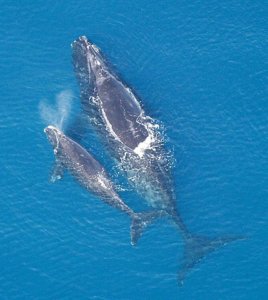 Q: The issues of right whales suffering from ship strikes and entanglements with fishing gear have attracted a lot of attention from scientists and the public. Did you find that the threats from climate change have been adequately studied to date?
Q: The issues of right whales suffering from ship strikes and entanglements with fishing gear have attracted a lot of attention from scientists and the public. Did you find that the threats from climate change have been adequately studied to date?
It certainly never hurts to learn more about the threats to a critically endangered species, especially when they involve an issue as dynamic and far-reaching as climate change. However, the science is already quite clear and the North Atlantic right whale simply does not have any time to waste. Immediate actions must be taken to protect this incredible species, or it will be lost forever. Once these actions are taken, more time and money can be put towards gaining further insight into how climate change is affecting the region so that future adaptation methods can be more effective.
Q: You propose a series of short- and long-term measures to protect right whales, including expanded speed restrictions in their habitat areas and mandates for the use of ropeless gear for some fisheries. If enacted, what kind of difference would you expect to see in their populations?
Removing the fast-moving vessels and dangerous fishing ropes from the areas where right whales are (or will soon be) found will have immediate positive impacts on the population. Just this summer, a 1-year-old right whale was killed by a ship strike in Elberon, New Jersey, a few minutes away from Monmouth University’s campus. If vessel speed reductions had been extended later into the summer here, this calf would still be swimming alongside his mother. Similarly, fishing gear presents both lethal and sublethal threats to whales, including the reproductive success of mature females, so removing the ropes will create benefits that go even beyond this generation of whales. Ropeless fishing gear is already being developed and implemented in other regions, so it is simply a matter of having the political and economic will to implement it in New England.

 Count among them Monmouth University Professor Pat Cresson, who recently created over 50 works highlighting both microscopic marine organisms and larger sea creatures. Cresson presented her collection, The Interface Between Marine Biology and Creative Microscopic Inhabitants of the Sea, in a free public webinar on Nov. 18. The session was offered as part of the Department of History & Anthropology’s Research and Teaching Pedagogy Seminar Series.
Count among them Monmouth University Professor Pat Cresson, who recently created over 50 works highlighting both microscopic marine organisms and larger sea creatures. Cresson presented her collection, The Interface Between Marine Biology and Creative Microscopic Inhabitants of the Sea, in a free public webinar on Nov. 18. The session was offered as part of the Department of History & Anthropology’s Research and Teaching Pedagogy Seminar Series.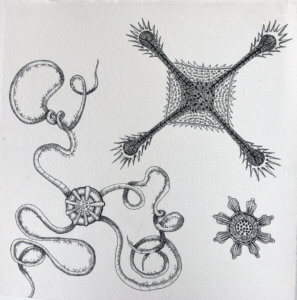 Cresson’s first works in the collection were detailed black ink drawings on heavy white watercolor paper. She then began creating a series of illustrations on deep wood panels that were covered with glued drawings on paper. Then an epoxy surface was poured over these panels, sometimes stained blue or green giving the appearance that they were submerged under water. She also created several collages on paper adhered to wood panels depicting ocean scenes. (Scroll to gallery below to view samples of her works.) Materials for the project were purchased through a faculty enrichment grant awarded via the Urban Coast Institute’s Heidi Lynn Sculthorpe Scholars program.
Cresson’s first works in the collection were detailed black ink drawings on heavy white watercolor paper. She then began creating a series of illustrations on deep wood panels that were covered with glued drawings on paper. Then an epoxy surface was poured over these panels, sometimes stained blue or green giving the appearance that they were submerged under water. She also created several collages on paper adhered to wood panels depicting ocean scenes. (Scroll to gallery below to view samples of her works.) Materials for the project were purchased through a faculty enrichment grant awarded via the Urban Coast Institute’s Heidi Lynn Sculthorpe Scholars program.











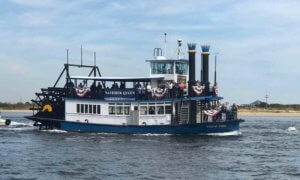 Come rolling on the rivers and bays with Capt. Dan Schade and his old-time paddle wheeler, the Navesink Queen, in the latest edition of the Mid-Atlantic Ocean Data Portal’s “Ocean Stories” series, created by UCI Communications Director Karl Vilacoba. The story and its interactive data maps provide a snapshot of life navigating the crowded waters of the Navesink and Shrewsbury rivers and Sandy Hook and Raritan bays aboard his fleet of classic boats.
Come rolling on the rivers and bays with Capt. Dan Schade and his old-time paddle wheeler, the Navesink Queen, in the latest edition of the Mid-Atlantic Ocean Data Portal’s “Ocean Stories” series, created by UCI Communications Director Karl Vilacoba. The story and its interactive data maps provide a snapshot of life navigating the crowded waters of the Navesink and Shrewsbury rivers and Sandy Hook and Raritan bays aboard his fleet of classic boats. 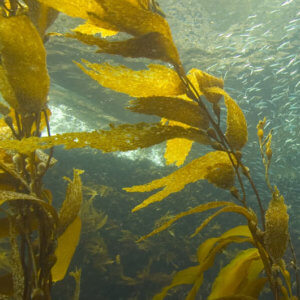 The Urban Coast Institute’s Marine & Environmental Speaker Series returns Nov. 10 from noon to 1 p.m. with “Is Seaweed a Fish?” by Ethan Prall, Esq. The talk is free and open to the public. Upon registration, attendees will receive an email with the Zoom link for the event.
The Urban Coast Institute’s Marine & Environmental Speaker Series returns Nov. 10 from noon to 1 p.m. with “Is Seaweed a Fish?” by Ethan Prall, Esq. The talk is free and open to the public. Upon registration, attendees will receive an email with the Zoom link for the event.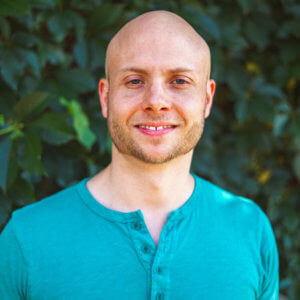 Ethan Prall, Esq. is an environmental lawyer and policy advocate at the law firm Latham & Watkins LLP, in Washington, DC. He represents clients on a variety of domestic and international environmental and clean energy law and policy, including: creating the government for a new clean energy zone overseas, offshore wind energy permitting, Endangered Species Act consultations, and litigating against the Trump Administration’s rollback of California’s vehicle emissions standards. His scholarly work focuses on addressing the global challenges posed by anthropogenic change on natural systems, such as climate change and biodiversity loss. His latest publication, forthcoming Spring 2021, focuses on U.S. federal regulation of seaweed farming as a potential climate change mitigation tool. He holds a B.A. from Texas A&M University, an M.T.S. from Duke University, and a J.D. from Harvard Law School.
Ethan Prall, Esq. is an environmental lawyer and policy advocate at the law firm Latham & Watkins LLP, in Washington, DC. He represents clients on a variety of domestic and international environmental and clean energy law and policy, including: creating the government for a new clean energy zone overseas, offshore wind energy permitting, Endangered Species Act consultations, and litigating against the Trump Administration’s rollback of California’s vehicle emissions standards. His scholarly work focuses on addressing the global challenges posed by anthropogenic change on natural systems, such as climate change and biodiversity loss. His latest publication, forthcoming Spring 2021, focuses on U.S. federal regulation of seaweed farming as a potential climate change mitigation tool. He holds a B.A. from Texas A&M University, an M.T.S. from Duke University, and a J.D. from Harvard Law School.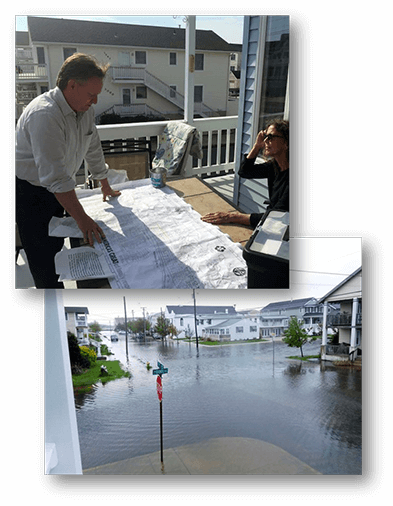 The award was presented during the Mid-Atlantic Sea Grant Region’s annual meeting, held virtually in October. Herrington serves as the
The award was presented during the Mid-Atlantic Sea Grant Region’s annual meeting, held virtually in October. Herrington serves as the 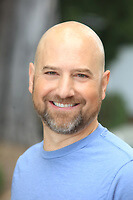 Dr. Jason Scorse completed his Ph.D. in Agricultural and Natural Resource Economics at UC-Berkeley in 2005 with a focus on environmental economics and policy, international development, and behavioral economics. Upon graduation, he became a full-time faculty member of the Middlebury Institute of International Studies at Monterey. Professor Scorse teaches courses in environmental and natural resource economics, ocean and coastal economics, and behavioral economics. In 2009, he was promoted to the Chair of the International Environmental Policy Program, and in 2011, he became the Director of the Center for the Blue Economy, which provides “leadership in research, education, and analysis to promote a sustainable ocean and coastal economy.” Professor Scorse’s book, What Environmentalists Need to Know About Economics, was published by Palgrave Macmillan in 2010. In his spare time, Professor Scorse longboards, cooks gourmet vegan food, and writes fiction for when he starts his new career after we’ve solved all of the world’s great environmental challenges.
Dr. Jason Scorse completed his Ph.D. in Agricultural and Natural Resource Economics at UC-Berkeley in 2005 with a focus on environmental economics and policy, international development, and behavioral economics. Upon graduation, he became a full-time faculty member of the Middlebury Institute of International Studies at Monterey. Professor Scorse teaches courses in environmental and natural resource economics, ocean and coastal economics, and behavioral economics. In 2009, he was promoted to the Chair of the International Environmental Policy Program, and in 2011, he became the Director of the Center for the Blue Economy, which provides “leadership in research, education, and analysis to promote a sustainable ocean and coastal economy.” Professor Scorse’s book, What Environmentalists Need to Know About Economics, was published by Palgrave Macmillan in 2010. In his spare time, Professor Scorse longboards, cooks gourmet vegan food, and writes fiction for when he starts his new career after we’ve solved all of the world’s great environmental challenges.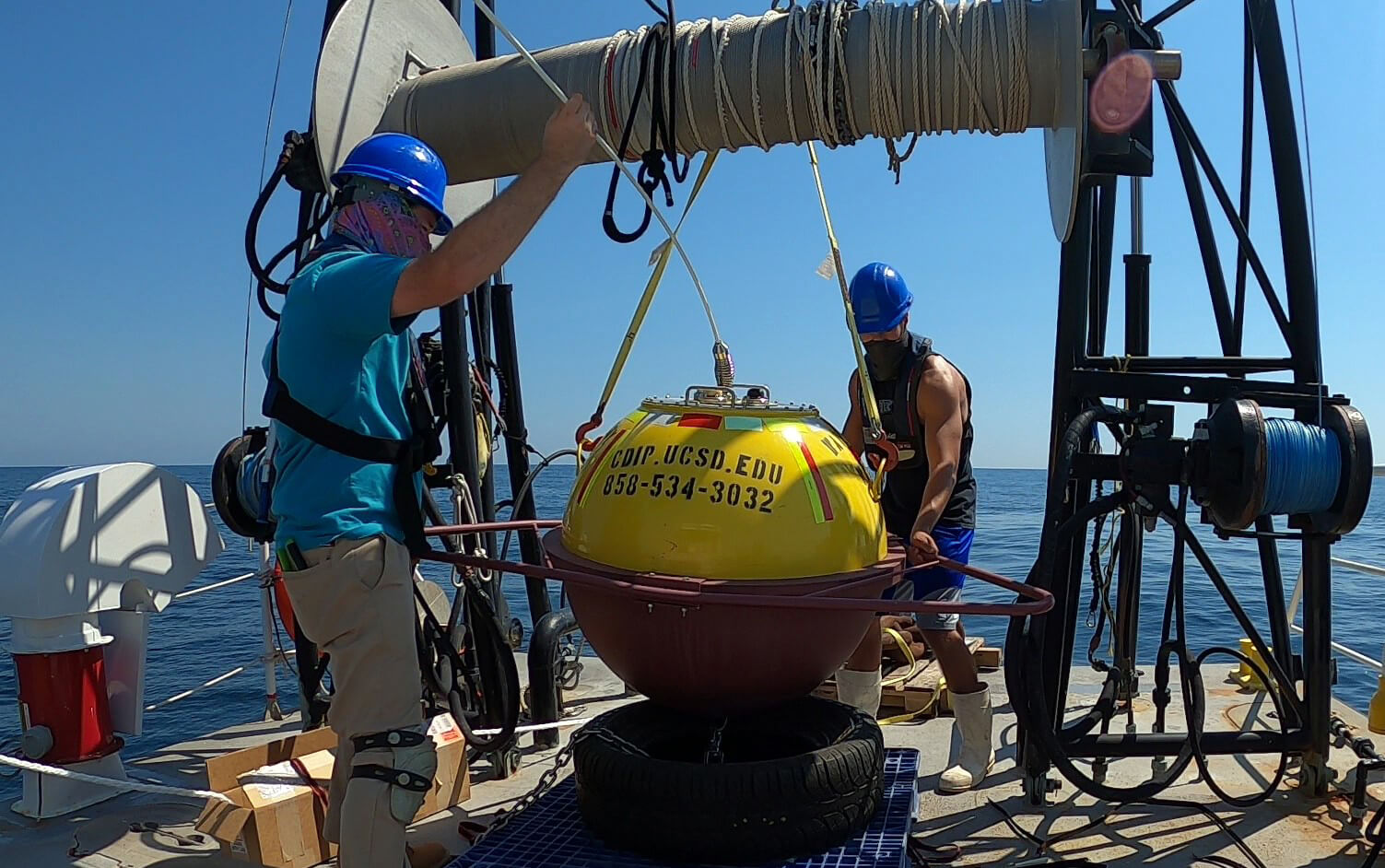
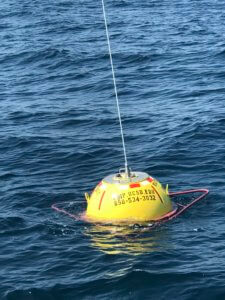 “The Jersey Shore sees very different wave fields than, say, North Carolina or even Delaware because Long Island Sound, Long Island itself and New England act as a natural breakwater for waves coming from the northeast,” Herrington said. “So the wave climate we have off New York Harbor is very different than the wave climate we have off Cape May. This buoy is really important to understanding what’s going on off our coast.”
“The Jersey Shore sees very different wave fields than, say, North Carolina or even Delaware because Long Island Sound, Long Island itself and New England act as a natural breakwater for waves coming from the northeast,” Herrington said. “So the wave climate we have off New York Harbor is very different than the wave climate we have off Cape May. This buoy is really important to understanding what’s going on off our coast.”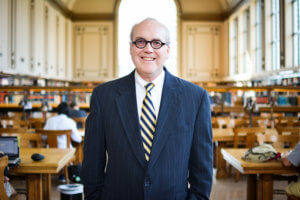 Dr. Wil Burns is a Professor of Research and Founding Co-Executive Director of the
Dr. Wil Burns is a Professor of Research and Founding Co-Executive Director of the  Student Researcher: London Jones
Student Researcher: London Jones As described in my paper, the practice of requiring beach tags imposes a disproportionate burden on Black beachgoers in cost, access, and how beach tag revenues are spent. Historically, beach tags were imposed as a way of keeping nonresidents off the beaches of certain towns, which had populations majorly consisting of white communities. Although rights for public access along New Jersey beaches have been secured, the constant increases in beach tag prices and caps on numbers of tags sold restricts access for low income communities and those who do not reside in the beach towns, which is primarily the Black community. Additionally, beach tag revenues are then spent on frivolous beach amenities rather than necessary spending to make those shorelines safer and more accessible to those who either visit after hours or forego attending the beach all together to avoid the need for beach tags.
As described in my paper, the practice of requiring beach tags imposes a disproportionate burden on Black beachgoers in cost, access, and how beach tag revenues are spent. Historically, beach tags were imposed as a way of keeping nonresidents off the beaches of certain towns, which had populations majorly consisting of white communities. Although rights for public access along New Jersey beaches have been secured, the constant increases in beach tag prices and caps on numbers of tags sold restricts access for low income communities and those who do not reside in the beach towns, which is primarily the Black community. Additionally, beach tag revenues are then spent on frivolous beach amenities rather than necessary spending to make those shorelines safer and more accessible to those who either visit after hours or forego attending the beach all together to avoid the need for beach tags. Student Researcher: Aidan Bodeo-Lomicky
Student Researcher: Aidan Bodeo-Lomicky Q: The issues of right whales suffering from ship strikes and entanglements with fishing gear have attracted a lot of attention from scientists and the public. Did you find that the threats from climate change have been adequately studied to date?
Q: The issues of right whales suffering from ship strikes and entanglements with fishing gear have attracted a lot of attention from scientists and the public. Did you find that the threats from climate change have been adequately studied to date?